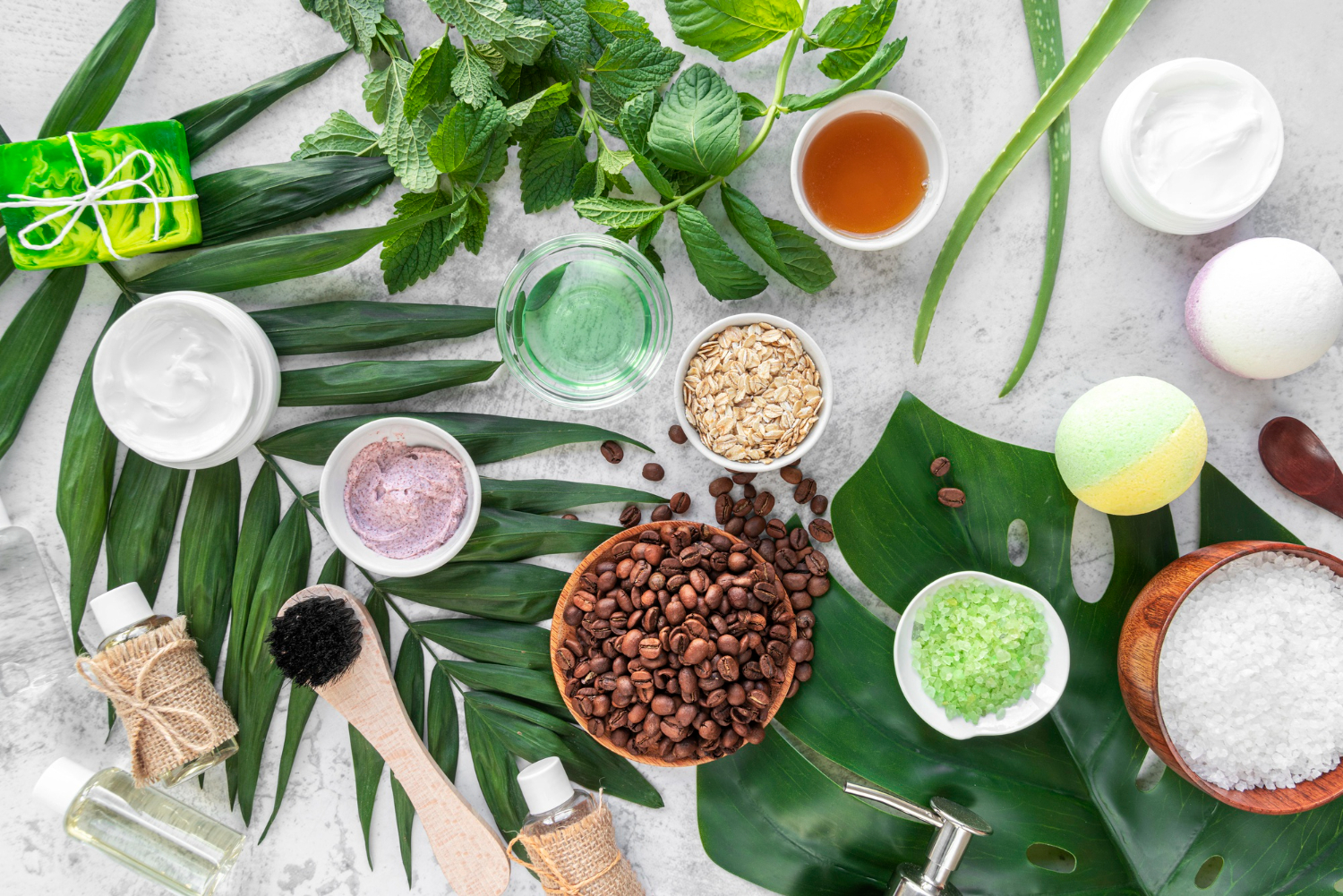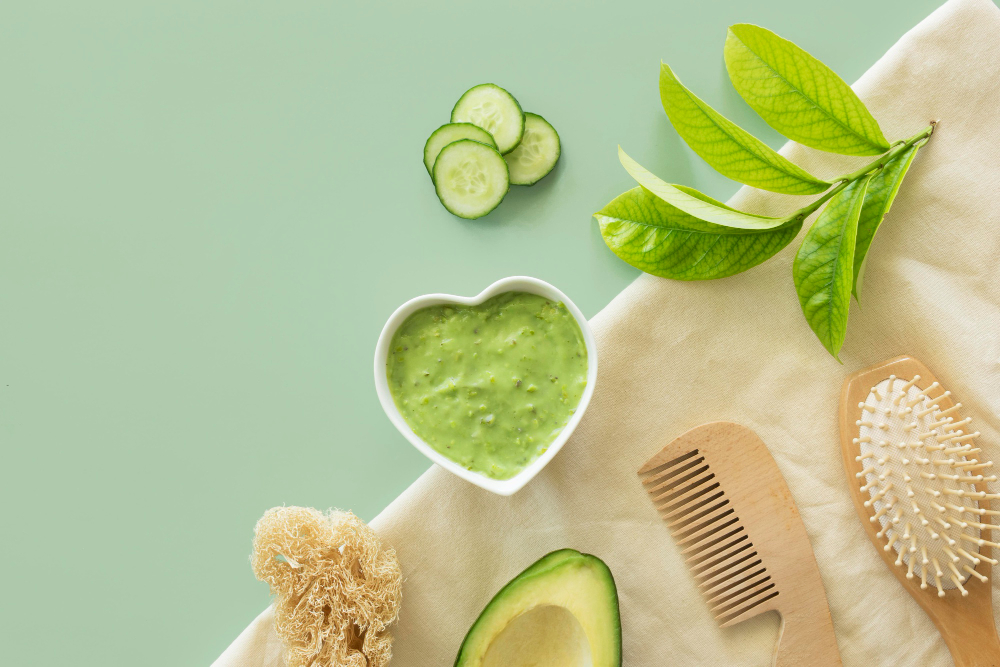Introduction to Vegan Skincare
The beauty industry has seen a significant shift in recent years towards more ethical and sustainable practices, and vegan skincare is at the forefront of this movement. Plant-based, cruelty-free skincare products are not just a trend; they represent a conscious choice for consumers who care about what goes on their skin and the impact it has on animals and the planet. In this blog post, we will delve into the world of vegan skincare, exploring the benefits, popular ingredients, and how to incorporate these products into your daily routine.
Understanding Vegan Skincare
What is Vegan Skincare?
Vegan skincare refers to products that are free from animal-derived ingredients. Unlike traditional skincare, which may include substances like beeswax, lanolin, or collagen, vegan skincare relies solely on plant-based components. This approach not only benefits your skin by using natural, nourishing ingredients but also aligns with ethical values by ensuring no animals are harmed in the process.
Why Choose Vegan Skincare?
Choosing vegan skincare is about more than just avoiding animal products; it’s a lifestyle choice that supports sustainability and compassion. By opting for plant-based, cruelty-free products, you contribute to reducing animal suffering and minimizing environmental impact. Moreover, vegan skincare is often free from harsh chemicals, making it a healthier option for your skin.
The Rise of Cruelty-Free Beauty
A Movement Towards Compassion
The Importance of Cruelty-Free Labels
The term “cruelty-free” means that a product and its ingredients have not been tested on animals at any stage of development. This label has become increasingly important to consumers who want to ensure that their beauty routines do not contribute to animal suffering. The rise of cruelty-free skincare is a testament to the growing awareness and demand for ethical beauty products.
The Difference Between Vegan and Cruelty-Free
It’s essential to understand that while vegan and cruelty-free often go hand in hand, they are not the same. A product can be cruelty-free without being vegan, meaning it wasn’t tested on animals but may still contain animal-derived ingredients. Conversely, a vegan product may not always be cruelty-free if it was tested on animals. The ideal choice for conscious consumers is to look for products that are both vegan and cruelty-free.
The Benefits of Plant-Based Ingredients
Nourishment from Nature
Plant-based skincare products are rich in vitamins, minerals, and antioxidants that nourish and protect the skin. Ingredients like aloe vera, chamomile, and green tea are known for their soothing properties, making them ideal for sensitive skin. Additionally, plant oils like jojoba, coconut, and argan oil provide deep hydration without clogging pores.
Environmental Impact
Choosing plant-based products also reduces the environmental footprint of your skincare routine. Plant ingredients are renewable resources, and many vegan skincare brands focus on sustainable farming practices and eco-friendly packaging. By supporting these brands, you’re contributing to a healthier planet.
Popular Vegan Skincare Ingredients
Aloe Vera: The Skin Soother
Why Aloe Vera is a Staple
Aloe vera is a powerhouse ingredient in vegan skincare. Known for its soothing and healing properties, aloe vera is perfect for calming irritated skin, reducing redness, and providing hydration. Its lightweight, gel-like texture makes it suitable for all skin types, including oily and acne-prone skin.
Incorporating Aloe Vera into Your Routine
You can find aloe vera in various forms, from pure gels to serums and moisturizers. It’s particularly beneficial in the summer months or after sun exposure, as it helps to cool and repair the skin. For a simple DIY treatment, you can even apply fresh aloe vera gel directly from the plant to your face.
Green Tea: The Antioxidant Hero
The Power of Antioxidants
Green tea is another popular ingredient in vegan skincare, renowned for its high antioxidant content. Antioxidants help protect the skin from free radical damage, which can lead to premature aging. Green tea also has anti-inflammatory properties, making it an excellent choice for those with sensitive or acne-prone skin.
Green Tea in Skincare Products
Green tea extract is commonly found in toners, cleansers, and face masks. Its refreshing and calming effects make it a great addition to your morning routine, helping to wake up your skin and prepare it for the day ahead.
Key Point 1:
Plant-based ingredients like aloe vera and green tea not only nourish the skin but also support sustainable and ethical practices.
The Benefits of Switching to Vegan Skincare
Healthier Skin with Fewer Chemicals
Avoiding Harsh Chemicals
One of the significant benefits of vegan skincare is that it often excludes harsh chemicals found in conventional products. Ingredients like parabens, sulfates, and synthetic fragrances can irritate the skin and disrupt its natural balance. Vegan skincare, on the other hand, focuses on gentle, plant-based ingredients that promote healthy, glowing skin.
Long-Term Skin Health
Using natural, plant-based ingredients can lead to healthier skin over time. These ingredients work in harmony with your skin’s natural processes, providing nutrients and hydration without the risk of irritation or long-term damage. As a result, you’ll notice an improvement in your skin’s texture, tone, and overall appearance.
Ethical and Environmental Benefits
Supporting Ethical Practices
By choosing vegan skincare, you’re supporting brands that prioritize ethical practices. This includes cruelty-free testing, sustainable sourcing of ingredients, and eco-friendly packaging. These brands are often transparent about their processes, allowing you to make informed choices that align with your values.
Reducing Your Environmental Footprint
The beauty industry has a significant environmental impact, from the sourcing of ingredients to the production of packaging. Vegan skincare brands are often at the forefront of reducing this impact by using sustainable materials, minimizing waste, and opting for recyclable or biodegradable packaging. This means that by choosing vegan skincare, you’re helping to protect the planet.
How to Transition to Vegan Skincare
Start with the Basics
Identify Vegan Alternatives
Transitioning to vegan skincare doesn’t have to happen overnight. Start by identifying vegan alternatives for your current products. For example, if you use a moisturizer that contains beeswax, look for one that uses plant-based oils or butters instead. Many vegan skincare brands offer starter kits or sample sizes, making it easy to try new products without a significant investment.
Check Labels and Certifications
When shopping for vegan skincare, it’s essential to check labels and look for certifications. Terms like “vegan,” “cruelty-free,” and “organic” can be helpful indicators, but certifications from organizations like PETA or The Vegan Society provide added assurance that the product meets strict ethical standards.
Incorporating Vegan Skincare into Your Routine
Layering for Maximum Benefit
Once you’ve selected your vegan skincare products, it’s time to incorporate them into your routine. The key to effective skincare is layering products in the correct order to maximize their benefits. Start with a gentle cleanser, followed by a toner, serum, and moisturizer. If you’re using treatments like exfoliants or masks, apply them after cleansing and before your serum.
Consistency is Key
As with any skincare routine, consistency is crucial. Stick to your vegan skincare regimen for at least a few weeks to allow your skin to adjust and start showing results. Remember, plant-based products work in harmony with your skin’s natural processes, so it may take a little time to see significant changes.
Key Point 2:
Transitioning to vegan skincare is a gradual process that involves finding suitable alternatives and maintaining a consistent routine for the best results.
Debunking Common Myths About Vegan Skincare
Myth 1: Vegan Skincare is Less Effective
The Truth About Plant-Based Ingredients
A common misconception is that vegan skincare is less effective than conventional products. However, many plant-based ingredients are just as powerful, if not more so, than their synthetic counterparts. For example, rosehip oil is a natural alternative to retinol, offering anti-aging benefits without the harsh side effects.
Scientific Backing
Many vegan skincare products are backed by scientific research, proving their efficacy. Brands often use clinically tested ingredients like hyaluronic acid derived from plants or peptides from natural sources to deliver visible results.
Myth 2: Vegan Skincare is Expensive
Affordable Vegan Options
Another myth is that vegan skincare is more expensive than traditional skincare. While some high-end vegan brands do come with a higher price tag, there are plenty of affordable options available. Many drugstore brands have embraced vegan formulations, offering effective products at a reasonable cost.
Long-Term Savings
Investing in vegan skincare can actually save you money in the long run. Because these products are often more concentrated and free from fillers, a little goes a long way. Additionally, the long-term benefits of using gentle, natural ingredients can lead to fewer skin issues, reducing the need for expensive treatments.
Choosing the Right Vegan Skincare Products for Your Skin Type
For Oily and Acne-Prone Skin
Ingredients to Look For
If you have oily or acne-prone skin, look for vegan skincare products that include ingredients like tea tree oil, witch hazel, and salicylic acid derived from willow bark. These ingredients help to balance oil production and reduce breakouts without stripping the skin of its natural moisture.
Recommended Products
Opt for a lightweight gel moisturizer and a clarifying toner that contains natural astringents. A clay mask with charcoal can also be beneficial for deep cleansing and preventing clogged pores.
For Dry and Sensitive Skin
Hydrating Ingredients
Dry and sensitive skin types will benefit from vegan skincare products rich in hydrating and soothing ingredients like aloe vera, chamomile, and oat extract. Look for products that provide deep moisture without heavy oils that can weigh down the skin.
Gentle Formulations
Choose a gentle, fragrance-free cleanser and a hydrating serum that includes hyaluronic acid from plant sources. A nourishing cream with shea butter or cocoa butter can help lock in moisture and protect your skin’s barrier.
Key Point 3:
Vegan skincare products are suitable for all skin types, offering tailored solutions for oily, acne-prone, dry, and sensitive skin.
Vegan Skincare and Anti-Aging
Plant-Based Anti-Aging Ingredients
Powerful Natural Alternatives
Anti-aging is a significant concern for many, and vegan skincare offers a range of powerful plant-based ingredients to address this issue. Retinol alternatives like bakuchiol and rosehip oil promote cell turnover and reduce the appearance of fine lines and wrinkles without causing irritation.
Antioxidant-Rich Formulas
Antioxidants play a crucial role in preventing premature aging by neutralizing free radicals. Ingredients like vitamin C from citrus fruits, green tea, and pomegranate extract are commonly found in vegan anti-aging products, offering protection and promoting a youthful glow.
Incorporating Anti-Aging Products into Your Routine
Layering for Maximum Effect
To get the most out of your anti-aging products, it’s essential to layer them correctly. Start with a gentle cleanser, followed by a toner rich in antioxidants. Apply your anti-aging serum next, and finish with a moisturizer that includes SPF during the day to protect against UV damage.
Consistency is Key
As with any skincare routine, consistency is crucial. Use your anti-aging products daily to see the best results. Over time, you’ll notice a reduction in fine lines, improved skin texture, and a more radiant complexion.
Vegan Skincare for Men
Why Men Should Consider Vegan Skincare
The Growing Trend
Men’s skincare is no longer an afterthought, and the demand for vegan skincare products designed specifically for men is on the rise. Many men are becoming more conscious of what they put on their skin and are seeking out plant-based, cruelty-free options.
Addressing Men’s Unique Skincare Needs
Men’s skin is typically thicker and more prone to oiliness, which can lead to different skincare needs. Vegan skincare products for men are formulated to address these concerns, offering solutions that are effective yet gentle.
Essential Vegan Skincare Products for Men
Cleansers and Shaving Products
Men should start with a gentle, sulfate-free cleanser that removes excess oil without stripping the skin. Shaving can be harsh on the skin, so look for vegan shaving creams and aftershaves that soothe and protect with ingredients like aloe vera and chamomile.
Moisturizers and Sunscreens
A lightweight, non-greasy moisturizer is essential for men’s skincare routines. Opt for a product that includes SPF to protect against sun damage. For those with beards, a vegan beard oil can keep facial hair soft and the skin underneath hydrated.
Key Point 4:
Vegan skincare is not just for women; men can benefit from plant-based, cruelty-free products that cater to their specific skincare needs.
The Future of Vegan Skincare
Innovations in Vegan Skincare
Sustainable and Ethical Advancements
The future of vegan skincare looks promising, with continuous innovations in sustainable and ethical practices. Brands are increasingly focusing on zero-waste packaging, upcycled ingredients, and biodegradable formulations. These advancements not only benefit the environment but also appeal to conscious consumers who value transparency and sustainability.
Tech-Driven Solutions
Technology is playing a significant role in the evolution of vegan skincare. From AI-driven personalized skincare routines to plant-based alternatives for traditionally synthetic ingredients, the industry is constantly evolving. Expect to see more customized skincare solutions that are both effective and environmentally friendly.
Supporting Small and Independent Brands
The Rise of Indie Brands
The demand for vegan skincare has led to the rise of small and independent brands that are often more agile and innovative than larger companies. These indie brands are at the forefront of the vegan skincare movement, offering unique products that cater to niche markets.
How to Support Indie Brands
Supporting small and independent vegan skincare brands is a great way to encourage innovation and ethical practices. Look for brands that align with your values, and don’t be afraid to try new products that may not yet be mainstream. Your support can help these brands grow and continue to offer high-quality, ethical skincare solutions.
DIY Vegan Skincare Recipes
Why Make Your Own Skincare Products?
Control Over Ingredients
One of the most significant benefits of making your own vegan skincare products is having complete control over the ingredients. You can choose organic, sustainably sourced components and avoid any allergens or irritants that may be present in store-bought products.
Cost-Effective Solutions
DIY vegan skincare can also be a cost-effective alternative to buying high-end products. With a few simple ingredients, you can create effective skincare treatments at a fraction of the price.
Simple DIY Recipes
Nourishing Face Mask
Ingredients:
- 1 tablespoon of oatmeal
- 1 tablespoon of mashed avocado
- 1 teaspoon of olive oil
Mix the ingredients together to form a paste. Apply to your face and leave on for 15-20 minutes before rinsing off with warm water. This mask is rich in vitamins and antioxidants, providing deep nourishment for your skin.
Refreshing Toner
Ingredients:
- 1 cup of green tea (cooled)
- 1 tablespoon of apple cider vinegar
- A few drops of tea tree oil
Combine the ingredients in a spray bottle and use as a toner after cleansing. This toner helps to balance the skin’s pH, reduce inflammation, and prevent breakouts.
Key Point 5:
Making your own vegan skincare products allows for complete control over ingredients and can be a cost-effective alternative to store-bought options.
Common Challenges and How to Overcome Them
Finding the Right Products
Navigating the Market
With so many vegan skincare products on the market, it can be overwhelming to find the right ones for your skin type. Start by identifying your skin concerns and researching products that target those issues. Reading reviews and checking ingredient lists can also help you make informed decisions.
Trial and Error
Don’t be discouraged if a product doesn’t work for you right away. Skincare is often a process of trial and error, and it may take some time to find the perfect products for your skin. Patience is key, and remember that consistency is crucial for seeing results.
Sticking to a Routine
Creating a Routine That Works
One of the most common challenges with skincare is sticking to a routine. Life can get busy, and it’s easy to skip steps or forget altogether. To overcome this, create a simple routine that fits your lifestyle. Start with the basics—a cleanser, moisturizer, and sunscreen—and build from there as you get more comfortable.
Staying Motivated
Staying motivated can be challenging, especially if you don’t see immediate results. Remember that skincare is a long-term commitment, and the benefits will become more apparent over time. Keep a journal of your progress, and celebrate small victories like fewer breakouts or smoother skin.
The Environmental Impact of Vegan Skincare
Reducing Waste
Zero-Waste Packaging
Many vegan skincare brands are leading the charge in reducing waste by using zero-waste packaging. This includes recyclable, compostable, or reusable materials that minimize the environmental footprint of your skincare routine. Brands are also moving away from single-use plastics in favor of glass or metal containers.
Supporting Sustainable Practices
In addition to reducing waste, vegan skincare brands often support sustainable practices such as ethical sourcing of ingredients and cruelty-free testing. By choosing these products, you’re contributing to a more sustainable beauty industry.
Water Conservation
The Role of Water in Skincare
Water is a precious resource, and the beauty industry is one of the largest consumers of water. Vegan skincare brands are increasingly aware of this issue and are taking steps to reduce water usage in their products. Waterless skincare products, such as oils, balms, and powders, are becoming more popular as they require less water in both production and use.
How You Can Help
As a consumer, you can help conserve water by choosing waterless skincare products and being mindful of your water usage during your skincare routine. Simple changes like turning off the tap while washing your face can make a significant difference.
The Social Impact of Vegan Skincare
Promoting Ethical Beauty
Challenging Industry Norms
The rise of vegan skincare is challenging traditional beauty industry norms. By prioritizing ethics and sustainability, vegan skincare brands are redefining what it means to be beautiful. This shift is not only changing consumer habits but also influencing how larger beauty companies approach product development.
Empowering Consumers
Vegan skincare empowers consumers to make choices that align with their values. It encourages people to think critically about the impact of their purchases and to demand better from the brands they support. This consumer-driven movement is leading to more transparency and accountability within the beauty industry.
Supporting Animal Rights
A Voice for the Voiceless
Vegan skincare is closely linked to the animal rights movement. By choosing cruelty-free products, you’re taking a stand against animal testing and the exploitation of animals for beauty. This simple choice has a powerful impact, helping to protect animals and promote more humane practices.
Spreading Awareness
As more people become aware of the benefits of vegan skincare, the movement continues to grow. Sharing your knowledge and experiences with others can help spread awareness and encourage more people to make the switch to ethical beauty products.
Conclusion: Embracing Vegan Skincare
A Lifestyle Choice
More Than Just Skincare
Vegan skincare is more than just a trend—it’s a lifestyle choice that reflects a commitment to ethics, sustainability, and health. By choosing vegan skincare products, you’re not only taking care of your skin but also contributing to a better world.
A Growing Community
The vegan skincare community is growing rapidly, with more people embracing this ethical approach to beauty. Whether you’re new to vegan skincare or have been using it for years, you’re part of a movement that is making a positive impact on the world.
Your Next Steps
Start Small
If you’re new to vegan skincare, start small. Replace one product at a time and see how your skin responds. As you become more comfortable, you can gradually transition your entire routine to vegan products.
Stay Informed
The vegan skincare industry is constantly evolving, with new products and innovations emerging all the time. Stay informed by reading labels, following vegan beauty blogs, and participating in online communities. The more you learn, the better equipped you’ll be to make informed choices that benefit your skin and the planet.
FAQs
- What is vegan skincare? Vegan skincare refers to products that do not contain any animal-derived ingredients and are not tested on animals. They are made from plant-based ingredients and are often more sustainable and ethical than conventional skincare products.
- Is vegan skincare better for your skin? Vegan skincare can be better for your skin, especially if you have sensitive skin or are prone to allergies. Plant-based ingredients tend to be gentler and less likely to cause irritation compared to synthetic or animal-derived ingredients.
- Are all cruelty-free products vegan? No, not all cruelty-free products are vegan. While cruelty-free products are not tested on animals, they may still contain animal-derived ingredients. Vegan products, on the other hand, are both cruelty-free and free from animal ingredients.
- Can vegan skincare help with acne? Yes, many vegan skincare products are formulated to help with acne. Ingredients like tea tree oil, salicylic acid derived from plants, and witch hazel can help reduce breakouts and soothe inflamed skin.
- Is vegan skincare suitable for all skin types? Vegan skincare is suitable for all skin types. There are products available for dry, oily, combination, and sensitive skin. The key is to choose products that are tailored to your specific skin needs.
- How do I know if a product is vegan? Look for certifications like the Vegan Society logo or check the ingredient list for animal-derived ingredients. Many brands also clearly label their products as vegan.
- Are vegan skincare products more expensive? Vegan skincare products can range in price, just like any other skincare products. While some high-end vegan products may be more expensive, there are also many affordable options available.
- Can I make my own vegan skincare products? Yes, you can make your own vegan skincare products at home using simple ingredients like coconut oil, aloe vera, and essential oils. DIY skincare can be a cost-effective and customizable option.
- What are some common ingredients in vegan skincare? Common ingredients in vegan skincare include aloe vera, coconut oil, shea butter, tea tree oil, and various plant extracts. These ingredients are known for their nourishing and healing properties.
- Where can I buy vegan skincare products? Vegan skincare products are available at health food stores, online retailers, and even some mainstream beauty stores. Many brands also sell directly through their websites.



